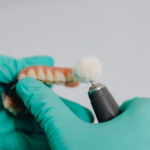Ever noticed a pinkish tinge in the sink after you brush your teeth? Or a little spot of blood when you floss? It’s a common occurrence, and many people tend to brush it off (pun intended!). But here’s the critical truth: bleeding gums are a warning sign from your body, and they should never be ignored.
While a stray bristle might occasionally cause a tiny speck of blood, persistent or unexplained bleeding from your gums is often an indicator of underlying issues that can range from easily treatable to seriously impactful on your overall health. Let’s delve into why paying attention to your bleeding gums is so important.
The Most Common Culprit: Gum Disease
In the vast majority of cases, bleeding gums are the earliest symptom of gum disease, also known as periodontal disease. This condition starts subtly but can escalate quickly if left unchecked.
- Gingivitis: The Early Warning. This is the mildest form of gum disease. It occurs when plaque – a sticky film of bacteria – builds up on your teeth, especially along the gumline. These bacteria irritate the gums, causing them to become red, swollen, tender, and, crucially, prone to bleeding during brushing or flossing. Good news: Gingivitis is often reversible with consistent and proper oral hygiene!
- Periodontitis: The Serious Progression. If gingivitis isn’t addressed, it can advance to periodontitis. Here, the inflammation spreads, and the bacteria begin to attack the tissues and bone that support your teeth. Pockets form between your teeth and gums, collecting more bacteria and leading to further destruction. Without intervention, periodontitis can result in receding gums, loose teeth, severe pain, and eventually, tooth loss. It’s the leading cause of tooth loss in adults.
Beyond the Mouth: Systemic Health Connections
Here’s where it gets even more critical. Your oral health is intrinsically linked to your overall bodily health. The bacteria and inflammation associated with bleeding gums and gum disease don’t necessarily stay confined to your mouth.
- Heart Disease and Stroke: Research has shown a connection between gum disease and cardiovascular conditions. The inflammation in your gums can contribute to inflammation throughout your body, potentially increasing the risk of heart attacks and strokes.
- Diabetes: There’s a bidirectional relationship here. People with diabetes are more susceptible to gum disease, and severe gum disease can, in turn, make it harder to control blood sugar levels. Managing gum health is a vital part of managing diabetes.
- Respiratory Issues: Bacteria from your mouth can be inhaled into your lungs, potentially contributing to respiratory problems like pneumonia, especially in vulnerable individuals.
- Pregnancy Complications: Hormonal changes during pregnancy can make gums more sensitive and prone to bleeding. Untreated gum disease in pregnant women has been linked to adverse outcomes like premature birth and low birth weight.
- Other Health Conditions: In some cases, bleeding gums can be a symptom of broader health issues, including certain blood disorders (like leukemia or clotting disorders), vitamin deficiencies (especially Vitamin C and K), and even liver disease. This is why a persistent problem warrants a professional medical opinion.
What Causes Bleeding Gums (and How to Prevent It)
While gum disease is the primary suspect, other factors can contribute to bleeding gums:
- Improper Brushing/Flossing: Brushing too hard or using a toothbrush with stiff bristles can irritate your gums. Similarly, if you’re new to flossing, some initial bleeding is common as your gums adjust.
- Medications: Certain medications, particularly blood thinners, can increase the likelihood of gum bleeding. Always inform your dentist about any medications you’re taking.
- Hormonal Changes: As mentioned, puberty, pregnancy, and menopause can make gums more sensitive.
- Poor Nutrition: Deficiencies in certain vitamins can impact gum health.
- Smoking/Tobacco Use: Tobacco significantly weakens your immune system and makes gums more vulnerable to infection, hindering healing.
- Stress: Chronic stress can compromise your body’s immune response, making you more susceptible to gum infections.
Don’t Delay – See Your Dentist!
The key takeaway is this: bleeding gums are a signal, not a normal occurrence. If you notice your gums bleeding consistently, especially during your oral hygiene routine, it’s crucial to schedule an appointment with your dentist without delay.
They can diagnose the root cause, whether it’s early gingivitis that needs a professional cleaning and improved home care, or a more serious underlying condition requiring specialized treatment. Early detection and intervention are vital to preventing minor issues from becoming major health concerns.
Invest in your oral health; it’s an investment in your overall well-being. A healthy smile is a confident smile, and it starts with healthy gums!








